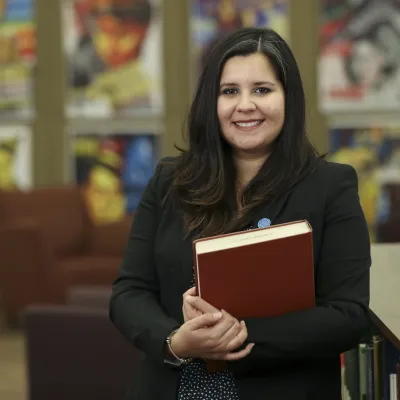
Miriam Fernandez
Contact
Office Hours
Bio
Podcast created for the National Humanities Center Summer Institute in Public Digital Humanities: https://soundcloud.com/miriam-fernandez-807958839/homecoming?si=2712765429374140b8b931fd09bfb3cf&utm_source=clipboard&utm_medium=text&utm_campaign=social_sharing
My Interview for the College of Arts and Letter Podcast: https://podcastindex.org/podcast/1328904?episode=16666249033
Education
2007 University of California, Los Angeles: BA in Sociology
2013 California State University, Fresno: MA in English
- With a Certificate of Advanced Study in Composition
2018 Washington State University: PhD in English, Rhetoric and Composition
- Dissertation The Rhetoric of Matriarchal Myths: Tracing the Colonial Origins of Mexican Nationalism was awarded the 2019 James Berlin Memorial Outstanding Dissertation Award
Courses/Teaching
Undergraduate Courses
- English 1070A: First Year Composition
- English 1300: Language, Society, and Power
- English 2000: Introduction to English Studies
- English 2400: Writing in the Public Sphere
- English 3066: Science Writing as Academic Inquiry
- English 3070: Theories of Public and Professional Writing
- English 5160: Professional Pathways for English Majors
Graduate Courses
- English 6090: Cultures of Research in English and Writing Studies
- English 6580: Multimodal Writing and the Public Sphere
Specialization
Rhetorical Theory; Composition Studies; Chicanx Rhetoric
Research and Teaching Interests
My current research focuses on Chicanx rhetorical practices and the rhetorical uses of Llorona storytelling. One of my research projects looks at the uses of epideictic rhetoric among Chicanas in the 1970s and 1980s as they reshaped the meaning of a Chicana feminist identity and claimed a feminist heritage going back to the colonization of Mexico. Another project I am currently working on analyzes the rhetorical purposes of Llorona storytelling. This project is an oral history project that records Mexican and Chicanx people's memories of hearing the Llorona story and analyzes the reasons why people choose to retell the story or to stop sharing the story with new generations.
One of my teaching interests is in the structure and writing of researched arguments. I like to work with students as they analyze how arguments are structured in academic and public or popular texts and guide them as they write their own arguments. My second teaching interest is in the intersection of rhetorical studies and public sphere theories.
Publications
Miriam L Fernandez (2023) Reclaiming Malintzin: Epideictic Practices of a Chicana Rhetoric, Rhetoric Review, 42:3, 139-153.
- Link to Reclaiming Malintzin Essay: https://www.tandfonline.com/doi/full/10.1080/07350198.2022.2157989
Miriam L. Fernandez (2021) La Llorona and Rhetorical Haunting in Mexico’s Public Sphere, Journal for the History of Rhetoric, 24:1, 54-68.
- Link to La Llorona and Rhetorical Haunting Essay: https://www.tandfonline.com/doi/full/10.1080/26878003.2021.1881310?scroll=top&needAccess=true